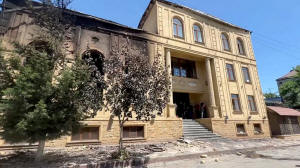Dagestan shootings spotlight rising Islamist threat for Putin
 Send a link to a friend
Send a link to a friend
 [June 25, 2024]
By Andrew Osborn [June 25, 2024]
By Andrew Osborn
LONDON (Reuters) - President Vladimir Putin says Russia's war in Ukraine
is part of an existential struggle with the West that demands total
focus - but deadly shootings in Dagestan show that militant Islam is a
rising threat that may force him to redirect resources.
The latest violence, in which at least 20 people were killed on Sunday
evening in a series of apparently coordinated shootings in Russia's far
south, raises awkward questions for its intelligence and security
services.
They appear to have been caught off guard at a time when much of their
attention is focused on Ukraine and the threat of Ukrainian-linked
attacks inside Russia.
"Radical Islamism is again raising its head in Russia," said Sergei
Markov, a former Kremlin adviser, who had just returned from a trip to
the North Caucasus region.
"It is clear that there is a problem with Islamist terrorism and it is
very serious. We need action from the authorities."
The reported involvement of two relatives of a local official who had
held a counter-terrorism meeting as recently as April, and another
attacker's past affiliation with a pro-Kremlin party, have raised fears
of infiltration of the local elite.
The attacks in Derbent and Makhachkala, in which a Russian Orthodox
priest and at least 15 policemen were killed and a synagogue was burned
down, is a blow to Putin's long-standing pledge to the Russian people
that he will ensure domestic stability.

Residents of Makhachkala, the regional capital, on Tuesday reported much
tighter security measures with more police patrols and vehicle
checkpoints as the city observed a second official day of mourning.
The assaults may also prompt a review in Moscow of the way that
impoverished majority-Muslim Dagestan is run, according to some experts.
The same region, some 1,600 km (1,000 miles) south of Moscow, was rocked
in October when rioters shouting "Allahu Akbar" or "God is Greatest"
stormed an airport to "catch" Jewish passengers on a flight from Tel
Aviv.
Dagestan is important to the military, and a naval base for Russia's
"Caspian Flotilla" is being built there.
To its west lies Chechnya, also a majority-Muslim region, where Moscow
has fought two wars with separatists since the 1991 collapse of the
Soviet Union.
Riccardo Valle, Director of Research at The Khorasan Diary, a
non-partisan centre that reports on militancy in the region, told
Reuters that Islamic State and other jihadist groups had been discussing
the opportunity that Russia's war in Ukraine presented for them.
He said the Ukraine war had hindered essential cooperation between
Moscow and the West on tackling Islamic State, as well as diverted
Russian resources, and that the Dagestan attack showed "a huge security
gap in Russian intelligence-gathering".
Meanwhile, he said, jihadists had been "writing in articles about how
Ukraine is the so-called 'black hole' for the West and Russia. Meaning
that, while the West and Russia are focusing their attention in Ukraine,
jihadists can take advantage of this situation and strike".

[to top of second column]
|

A view of Derbent synagogue following an attack by gunmen and a
fire, in Derbent in the region of Dagestan, Russia June 24, 2024, in
this still image taken from video. Head of the Dagestan region
Sergei Melikov via Telegram/Handout via REUTERS/File Photo

DAGESTAN SHOOTINGS FOLLOW CONCERT HALL ATTACK
In an attack in March claimed by Islamic State, gunmen raided the
Crocus City concert hall near Moscow, killing nearly 150 people in
an incident that Moscow suggested Ukraine had also had a hand in
directing - an allegation Kyiv denied.
And just over a week ago, a bloody Islamic State-linked prison
uprising took place in Rostov, southern Russia, in which special
forces shot dead six inmates who had taken hostages.
Western military experts said Sunday's attacks looked well planned
and coordinated.
There was no immediate claim of responsibility. But the Russian
branch of Islamic State-Khorasan's Al-Azaim Media posted a statement
praising what it called "brothers from the Caucasus" for the attack.
The Washington-based Institute for the Study of War said in a
research note that Wilayat Kavkaz, the Northern Caucasus branch of
Islamic State, had "likely conducted" the shootings.
The Kremlin said Putin had been following events closely and giving
orders, and that an investigation was under way.
When asked by a reporter, Putin's spokesman played down fears of any
return to the late 1990s and early 2000s, a period when Islamist
militants launched regular attacks on civilian targets across
Russia.
"Russia is different now, society is absolutely consolidated. And
such criminal terrorist manifestations as we saw in Dagestan
yesterday are not supported by society, either in Russia itself or
in Dagestan," Dmitry Peskov said.
Sergei Melikov, head of the Dagestan region, called the attacks an
attempt to destabilize society.

The United States gave Russia advanced warning of the Moscow concert
hall attack in March, but the Kremlin has insisted that it has not
taken its eye off the ball, and that no country is immune to
terrorism, while accepting that the Ukraine war has damaged
international counter-terrorism cooperation.
Valle, of the Khorasan Diary, said that "some days ago, Turkish
government sources revealed that Turkey helped Russia to disrupt a
cell which intended to carry out another attack in Moscow ...
"So it means that there is an ongoing issue within the security
environment in Russia which has been deepened by the war in
Ukraine."
(Reporting by Andrew Osborn; Additional reporting by Mark Trevelyan;
Editing by Mike Collett-White and Kevin Liffey)
[© 2024 Thomson Reuters. All rights reserved.]This material
may not be published, broadcast, rewritten or redistributed.
Thompson Reuters is solely responsible for this content. |